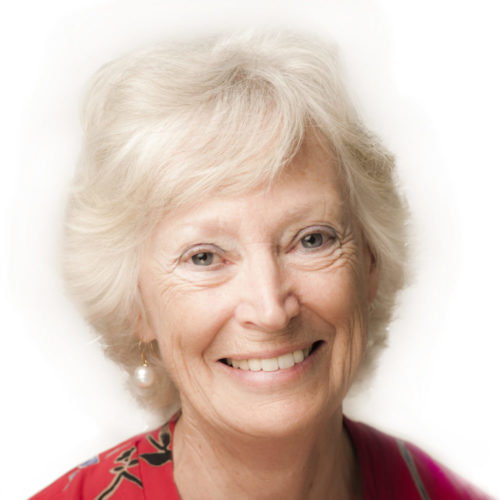In memory of Professor Russell’s contributions to both ANZUP and the field of prostate cancer research and therapy, we would like to share her final interview with ANZUP. From her instrumental role in the establishment of ANZUP Cancer Trials Group, to being a key member of the Scientific Advisory Committee (SAC), Pamela Russell then stepped down from her role with the group in 2020. We are extremely grateful for everything Professor Russell contributed to ANZUP as well as to prostate cancer scientific research and autoimmune diseases. She accomplished an incredible amount over the course of her career and did so much for not just ANZUP, but many people as well.
Professor Russell’s scientific career began at Melbourne University when she studied for a Bachelor of Science, majoring in biochemistry and microbiology. She was then extremely fortunate to undertake an MSc under the supervision of Sir Macfarlane Burnet, a Nobel Prize winner. Following this, she completed a PhD with Sir Gustav JV Nossal on mouse models of autoimmunity. Her great interest in “translational” research began at this time. Professor Russell could see the possibility for research to translate to clinical treatments. Her research enabled her to be the first to use cyclophosphamide as a treatment for some patients with Systemic Lupus Erythematosus. This treatment is still used for some patients 50 years later.
Professor Russell’s career then led her to lecturing at both the Australian National University and the Canberra University, and research at the Kolling Institute of Medical Science. Working with the oncologist Dr Derek Raghavan and the iconic urological surgeon, Dr Bruce Pearson, her research then moved to genitourinary oncology at the University of Sydney. Together they xenografted small fragments of bladder or prostate tumours from patients into nude mice to establish cancer xenograft lines that could be passaged from mouse to mouse in vivo. In addition, they established three new bladder cancer cell lines that could be passaged in vitro. In vivo studies using the bladder xenografts lines showed that a new drug, isopropyl cisplatin, was effective against bladder cancer and this has been translated to the clinic.
Around this time, Professor Russell realised funding from NH&MRC was much higher for breast cancer than prostate cancer. She approached Roger Climpson, a television star, who suffered from prostate cancer, to see if he might help. Together with his Rotarian colleagues, they set up the Prostate Cancer Research Foundation, which subsequently joined with Prostate Cancer Support Groups to form the Prostate Cancer Foundation of Australia. Professor Russell was an inaugural director.
With immunology colleagues, led by Prof Tony Basten, from the University of Sydney, they made monoclonal antibodies against one of the bladder cancer lines that could be used to detect bladder cancer cells in urine specimens. One of the antibodies binds to glypican-1, expressed on prostate cancers, and some other solid tumours. The preclinical studies showed that a derivative of this antibody had potential both for imaging and treatment of tumours when appropriately radiolabelled. At this stage in her career she continued these studies as Director, Oncology Research Centre at Prince of Wales Hospital in Sydney. Professor Russell worked for 10 years with colleagues (Judith Clements and Colleen Nelson) on prostate cancer at the Australian Prostate Cancer Research Centre at the Queensland University of Technology, located in the Translational Research Institute, Queensland.
Whilst in Queensland, Professor Russell was invited to be a member of the Movember International Committee. Their mandate was to bring together and competitively fund research groups to form international consortia who would share their experience and where possible, patient samples, to address difficult areas of prostate cancer research. As a member of this international committee, she was also a member of the Research Advisory Committee of Movember’s Global Action Plan One. Movember are now funding some clinical trials, including ANZUP’s TIGER trial for the treatment of germ cell tumours.
Prior to the days of multidisciplinary team clinics to discuss patient treatments Professor Russell realised there was a gap in knowledge of what differently skilled groups, such as oncologists, radiation oncologists, surgeons, scientists, pathologists and others were attempting to achieve. Her colleagues from different disciplines and herself, set up the Genitourinary Oncology Group (GUOG) in an attempt to overcome this problem. The group was initially set up in NSW and eventually throughout Australia and New Zealand. This group enabled people to interact in their research and clinical studies and develop friendships with people in different disciplines. They also ran a series of expert led education programmes and three international conferences but did not fully attain their goal of increased involvement in clinical trials. Then around this time development of ANZUP began. Professor Russell was delighted to join the discussions which led to the formation of the group, and she joined the initial board.
ANZUP was able to fulfil the need for collaboration on clinical trials along with a multidisciplinary focus. Her involvement with ANZUP demonstrated their special role in listening to the patient voice as well as their commitment to running clinical trials for urogenital cancers, some led in Australia or New Zealand and others by international colleagues.
As Professor Russell stepped away from ANZUP, she was happy to say she had the pleasure of being a part of their continued development and growing reputation. She believed ANZUP’s annual scientific meetings provided a paradigm for other groups. They are increasingly well attended and allow vigorous discussion and other interactions between invited international experts, Australian and New Zealand specialist groups and younger medical personnel, nurses, researchers, clinical trials specialists and psychologists. In addition, the ASM provides an open platform for questions and discussion with patients and their loved ones.
Research is a critical and necessary step in the development of new treatments, in ironing out difficulties experienced with current procedures and in moving forwards into new areas of endeavour to help treatment of patients with cancer. There is still so much more that can be done in urogenital oncology clinical trials. Professor Russell’s belief was that combination therapies will become a more prominent feature of new clinical trials. Immunotherapy together with current therapies is already being proposed for bladder, renal and other cancers. Understanding the role of the microbiome in the response to therapy will become an increasing area of research given the role of the gut in stimulating immune responses and how this can be affected by “bad” bacteria. Combined preclinical and clinical studies of patients with melanoma have shown that the microbiome can affect responses to immunotherapy or combined therapy for treating this cancer. In addition, given the enormous costs involved in the development of new drugs, Professor Russell believed there would be an increased energy in studies for repurposing existing drugs. She went on to state – all of this indicates ANZUP will continue down its very successful path.
Professor Russell thanked ANZUP for the friendships made, the strategies developed whilst she was on the Scientific Advisory Committee, the urogenital clinical trials that progressed, the highly successful fundraising undertaken and ultimately for raising awareness and helping in the treatment of urogenital cancers. She went on to say – ANZUP has, and will continue to be at the forefront of many clinical trials for bladder, germ cell, renal, prostate and kidney cancers and she wished ANZUP every success for the future.
Emeritus Professor Russell was instrumental in the establishment of ANZUP and will be fondly remembered for the key role she played in the organisation as well as prostate cancer scientific research.
Vale.

